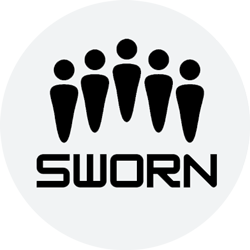First responders face immense pressure daily, with depression and PTSD rates five times higher than the general population. Their mindset – fixed or growth – can significantly impact their mental health and performance.
- Fixed Mindset: Believes abilities are unchangeable, leading to fear of failure, resistance to feedback, and stress in new challenges.
- Growth Mindset: Sees abilities as developable, encourages learning from mistakes, and fosters resilience in tough situations.
Key Takeaways:
- A growth mindset helps first responders adapt, learn, and manage stress effectively.
- Tools like SWORN.AI use real-time biometrics and personalized strategies to support mindset shifts.
- Practical steps include treating challenges as learning opportunities, using feedback constructively, and replacing negative self-talk.
Why it matters: Adopting a growth mindset can improve decision-making, teamwork, and mental health in high-pressure environments. Learn how to start shifting today.
Fixed vs. Growth Mindset Basics
Fixed Mindset Explained
A fixed mindset assumes that abilities, intelligence, and talents are set in stone. In high-pressure fields like emergency services, this mindset can show up in several ways:
- Avoiding challenges due to fear of failure
- Taking feedback as personal criticism
- Resisting new protocols or technologies
- Viewing mistakes as permanent flaws
For first responders, this mindset can be a roadblock, especially when quick thinking and adaptability are essential during emergencies.
Growth Mindset Explained
A growth mindset, on the other hand, sees abilities as something that can be developed through effort and learning. People with this mindset treat challenges as opportunities, not threats. Here’s how it plays out for first responders:
| Growth Mindset Trait | How It Helps First Responders |
|---|---|
| Tackles challenges head-on | Treats tough calls as chances to grow |
| Values consistent effort | Recognizes that practice builds mastery |
| Learns from feedback | Uses criticism to improve skills |
| Finds inspiration in others | Engages in mentorship and team learning |
These traits help first responders perform more effectively, especially in high-stress situations. The way they view their abilities can directly influence how they respond under pressure.
Impact on First Responder Performance
A growth mindset can significantly improve how first responders handle demanding scenarios. With 85% of first responders reporting symptoms of mental health conditions, having a positive approach to challenges is critical for long-term success in the field.
Here’s how a growth mindset benefits first responders:
- Adapting to Change: New protocols and technologies are seen as opportunities to improve.
- Building Resilience: Continuous learning helps manage stress more effectively.
- Improving Team Dynamics: Encourages an environment where mistakes become learning moments.
Modern tools are stepping in to support this mindset shift. For example, SWORN.ai integrates real-time biometric data with personalized training suggestions. This allows first responders to monitor their progress and adapt based on evidence rather than rigid beliefs.
Signs of Fixed Mindset at Work
Key Warning Signs
First responders with a fixed mindset often show behaviors that can reduce their effectiveness during high-pressure situations:
| Warning Sign | Behavior | Impact on Operations |
|---|---|---|
| Risk Avoidance | Hesitating to take charge during emergencies | Delays in critical decision-making |
| Defensive Response | Becoming defensive during performance reviews | Limits team learning and growth |
| Skill Stagnation | Resisting new training or equipment updates | Leads to outdated skills and tools |
| Self-Limiting Language | Using phrases that undermine self-confidence | Decreases overall performance |
| Comparison Focus | Comparing themselves to others instead of improving | Creates tension within the team |
These behaviors, if consistent, highlight potential fixed mindset challenges. According to SWORN.ai’s biometric monitoring data, responders showing these signs often experience elevated stress levels, even during routine calls.
Effects on Job Performance
A fixed mindset can significantly impact job performance, teamwork, and career advancement.
Operational Impact
- Slower response times due to hesitation or self-doubt.
- Poor communication within multi-agency teams.
- Reduced ability to make quick decisions under pressure.
Team Dynamics
- Limited sharing of critical information during emergencies.
- Lower participation in cross-training efforts.
- Decline in collaborative problem-solving.
Career Development
- Fewer training opportunities are embraced.
- Resistance to new protocols and technologies.
- Reduced chances for career advancement.
Tools like SWORN.ai can detect these patterns early, allowing for timely interventions. In high-stakes scenarios, responders with fixed mindsets tend to stick to familiar methods, even when better options are available. Data from real-time performance tracking shows a strong connection between fixed mindset traits and stress-related performance issues during complex calls. Spotting these patterns early is crucial for ensuring growth and improving operational efficiency.
Developing a Growth Mindset with Carol Dweck
sbb-itb-aa48905
5 Steps to Build Growth Mindset
Boost your performance by developing a growth mindset. Follow these five practical steps.
Turn Challenges into Learning Opportunities
Shift your perspective on stressors by viewing them as chances to grow. Keep a post-incident learning log to track your progress:
| Challenge Faced | Lessons Learned | Future Application |
|---|---|---|
| Multi-casualty incident | Resource prioritization | Develop better triage protocols |
| Complex rescue operation | Team coordination | Create rapid deployment plans |
| High-risk situation | Decision-making | Build scenario response guides |
This method helps strengthen resilience and improves decision-making during high-pressure situations.
Use Feedback to Improve
Turn performance reviews into a tool for growth by focusing on actionable steps:
- Write down specific examples and ask for clarification when needed.
- Develop a clear plan to implement suggested changes.
- Schedule follow-ups to review progress.
By focusing on these steps, you can refine your skills and better handle demanding situations.
Daily Self-Assessment
Incorporate a daily self-check using real-time biometric tracking to:
- Monitor your physical and mental readiness.
- Identify when you’re at your peak performance.
- Adjust your work based on energy levels.
- Set realistic improvement goals.
This approach gives you a clearer understanding of your capabilities, helping you stay prepared and effective.
Change Negative Self-Talk
Replace unhelpful thoughts with constructive ones:
| Instead of Saying | Shift to Thinking |
|---|---|
| "I can’t handle this" | "I’m learning to manage this" |
| "This is too overwhelming" | "I can break this down into steps" |
| "I made a mistake" | "I found an area to improve" |
A positive mindset can make a huge difference in how you approach challenges.
Use Support Tools
Take advantage of technology and resources to maintain steady growth:
- Access wellness programs and support.
- Use evidence-based training materials.
- Join peer support networks.
- Develop personalized self-care plans.
These tools help you stay resilient and perform effectively, even in tough situations.
Real-Life Applications
Learning New Skills
First responders often need to learn and adapt to new protocols and procedures. A practical approach is to tackle one component at a time, using real-time biometric data to track progress and identify the best times for training. By focusing on peak performance periods, individuals can maximize their learning.
Here’s how targeted training can make a difference:
| Skill Type | Approach | Benefit |
|---|---|---|
| Medical Protocols | Train during peak alertness hours | Stronger retention and execution |
| Emergency Response | Break tasks into smaller components | Faster reaction times |
| Crisis Management | Practice with regular scenario drills | Better decision-making |
As individual skills improve, teamwork becomes a driving force for overall success.
Team Growth Strategies
Creating a supportive team environment is key to collective success. Here are two effective strategies:
- Peer Learning Sessions: Organize regular meetings where team members share experiences and insights. These sessions encourage collaboration and help build a shared knowledge base.
- Collaborative Problem-Solving: After challenging incidents, hold structured debriefs to focus on lessons learned rather than assigning blame. This approach strengthens team dynamics and promotes continuous improvement.
These methods not only enhance individual abilities but also reinforce teamwork, which is critical in high-pressure roles.
Using New Tools
Advanced tools can play a significant role in building resilience and maintaining peak performance. Incorporating technology into daily routines offers additional support for both personal and team growth.
AI-driven platforms can help by:
- Monitoring stress levels
- Providing personalized training plans
- Offering evidence-based wellness strategies
- Delivering timely interventions
"SWORN.AI is the first public safety health, wellness and performance platform integrating AI, real-time biometrics, real-world experience data, and steadfast peer, family & professional support."
Long-Term Mindset Maintenance
Maintaining a growth mindset takes consistent effort, especially in high-stress roles like those of first responders, where mental resilience is essential. Below are strategies that help sustain this mindset over time.
Peer Support Systems
Strong peer networks provide a solid base for resilience and ongoing growth. With 85% of first responders reporting symptoms of mental health challenges, having dependable support systems is crucial for staying positive and focused.
| Support Type | Purpose | Implementation |
|---|---|---|
| Peer Groups | Shared experiences and regular check-ins | Weekly scheduled sessions |
| Mentorship | Guidance from seasoned colleagues | Monthly one-on-one meetings |
| Crisis Support | Immediate help during tough situations | 24/7 peer availability |
Leading by Example
Supervisors have a powerful influence on team resilience and mindset. Their behavior sets the tone for a growth-focused workplace. Effective leadership practices include:
- Sharing personal learning experiences openly
- Admitting mistakes and discussing lessons learned
- Recognizing team members who show growth-oriented behaviors
- Actively participating in wellness programs
In addition to leadership, technology plays a key role in supporting long-term growth.
Regular Training Tools
Modern tools help reinforce development through:
- Real-time biometric monitoring to manage stress
- Tailored training suggestions based on performance data
- Wellness strategies delivered when they’re most effective
- Anonymous progress tracking to identify areas for improvement
"SWORN.AI is the first public safety health, wellness and performance platform integrating AI, real-time biometrics, real-world experience data, and steadfast peer, family & professional support."
Conclusion
Transitioning from a fixed mindset to a growth mindset is essential for first responders working in high-pressure environments. The elevated mental health risks they face highlight the importance of this shift.
Modern AI tools now offer real-time biometric data and tailored recommendations, helping first responders maintain peak performance even under intense stress.
Here are three core practices that support this shift:
- Regular Self-Assessment: Continuously track both physical and mental health using biometric tools.
- Engagement with Support Systems: Lean on peers, family, and professional networks for assistance.
- Use of Proven Strategies: Apply science-backed methods for managing stress and building resilience.
These practices align with the strategies covered in this guide and lay the groundwork for lasting improvements.
Encouraging ongoing learning and adaptability is key to improving both personal well-being and team effectiveness.
SWORN.ai’s approach integrates real-time monitoring with tailored interventions, offering timely support to help first responders develop the resilience needed for their demanding roles.
"SWORN.AI is the first public safety health, wellness and performance platform integrating AI, real-time biometrics, real-world experience data, and steadfast peer, family & professional support."






